
1 The Blue Angels is the United States Navy's flight demonstration squadron, with aviators from the Navy and Marines. The Blue Angels team was formed in 1946, making it the second oldest formal flying aerobatic team (under the same name) in the world, after the French Patrouille de France formed in 1931.
The Blue Angels' six demonstration pilots currently fly the McDonnell Douglas F/A-18 Hornet, typically in more than 70 shows at 34 locations throughout the United States each year, where they still employ many of the same practices and techniques used in their aerial displays in their inaugural 1946 season. An estimated 11 million spectators view the squadron during air shows each full year. The Blue Angels also visit more than 50,000 people in a standard show season (March through November) in schools and hospitals. Since 1946, the Blue Angels have flown for more than 260 million spectators.
The Blue Angels' six demonstration pilots currently fly the McDonnell Douglas F/A-18 Hornet, typically in more than 70 shows at 34 locations throughout the United States each year, where they still employ many of the same practices and techniques used in their aerial displays in their inaugural 1946 season. An estimated 11 million spectators view the squadron during air shows each full year. The Blue Angels also visit more than 50,000 people in a standard show season (March through November) in schools and hospitals. Since 1946, the Blue Angels have flown for more than 260 million spectators.

2 The Blue Angels is the United States Navy's flight demonstration squadron, with aviators from the Navy and Marines. The Blue Angels team was formed in 1946, making it the second oldest formal flying aerobatic team (under the same name) in the world, after the French Patrouille de France formed in 1931.
The Blue Angels' six demonstration pilots currently fly the McDonnell Douglas F/A-18 Hornet, typically in more than 70 shows at 34 locations throughout the United States each year, where they still employ many of the same practices and techniques used in their aerial displays in their inaugural 1946 season. An estimated 11 million spectators view the squadron during air shows each full year. The Blue Angels also visit more than 50,000 people in a standard show season (March through November) in schools and hospitals. Since 1946, the Blue Angels have flown for more than 260 million spectators.
The Blue Angels' six demonstration pilots currently fly the McDonnell Douglas F/A-18 Hornet, typically in more than 70 shows at 34 locations throughout the United States each year, where they still employ many of the same practices and techniques used in their aerial displays in their inaugural 1946 season. An estimated 11 million spectators view the squadron during air shows each full year. The Blue Angels also visit more than 50,000 people in a standard show season (March through November) in schools and hospitals. Since 1946, the Blue Angels have flown for more than 260 million spectators.
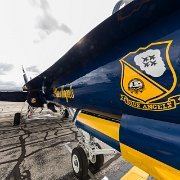
3 The Blue Angels is the United States Navy's flight demonstration squadron, with aviators from the Navy and Marines. The Blue Angels team was formed in 1946, making it the second oldest formal flying aerobatic team (under the same name) in the world, after the French Patrouille de France formed in 1931.
The Blue Angels' six demonstration pilots currently fly the McDonnell Douglas F/A-18 Hornet, typically in more than 70 shows at 34 locations throughout the United States each year, where they still employ many of the same practices and techniques used in their aerial displays in their inaugural 1946 season. An estimated 11 million spectators view the squadron during air shows each full year. The Blue Angels also visit more than 50,000 people in a standard show season (March through November) in schools and hospitals. Since 1946, the Blue Angels have flown for more than 260 million spectators.
The Blue Angels' six demonstration pilots currently fly the McDonnell Douglas F/A-18 Hornet, typically in more than 70 shows at 34 locations throughout the United States each year, where they still employ many of the same practices and techniques used in their aerial displays in their inaugural 1946 season. An estimated 11 million spectators view the squadron during air shows each full year. The Blue Angels also visit more than 50,000 people in a standard show season (March through November) in schools and hospitals. Since 1946, the Blue Angels have flown for more than 260 million spectators.

4 The Blue Angels is the United States Navy's flight demonstration squadron, with aviators from the Navy and Marines. The Blue Angels team was formed in 1946, making it the second oldest formal flying aerobatic team (under the same name) in the world, after the French Patrouille de France formed in 1931.
The Blue Angels' six demonstration pilots currently fly the McDonnell Douglas F/A-18 Hornet, typically in more than 70 shows at 34 locations throughout the United States each year, where they still employ many of the same practices and techniques used in their aerial displays in their inaugural 1946 season. An estimated 11 million spectators view the squadron during air shows each full year. The Blue Angels also visit more than 50,000 people in a standard show season (March through November) in schools and hospitals. Since 1946, the Blue Angels have flown for more than 260 million spectators.
The Blue Angels' six demonstration pilots currently fly the McDonnell Douglas F/A-18 Hornet, typically in more than 70 shows at 34 locations throughout the United States each year, where they still employ many of the same practices and techniques used in their aerial displays in their inaugural 1946 season. An estimated 11 million spectators view the squadron during air shows each full year. The Blue Angels also visit more than 50,000 people in a standard show season (March through November) in schools and hospitals. Since 1946, the Blue Angels have flown for more than 260 million spectators.

5 The Blue Angels is the United States Navy's flight demonstration squadron, with aviators from the Navy and Marines. The Blue Angels team was formed in 1946, making it the second oldest formal flying aerobatic team (under the same name) in the world, after the French Patrouille de France formed in 1931.
The Blue Angels' six demonstration pilots currently fly the McDonnell Douglas F/A-18 Hornet, typically in more than 70 shows at 34 locations throughout the United States each year, where they still employ many of the same practices and techniques used in their aerial displays in their inaugural 1946 season. An estimated 11 million spectators view the squadron during air shows each full year. The Blue Angels also visit more than 50,000 people in a standard show season (March through November) in schools and hospitals. Since 1946, the Blue Angels have flown for more than 260 million spectators.
The Blue Angels' six demonstration pilots currently fly the McDonnell Douglas F/A-18 Hornet, typically in more than 70 shows at 34 locations throughout the United States each year, where they still employ many of the same practices and techniques used in their aerial displays in their inaugural 1946 season. An estimated 11 million spectators view the squadron during air shows each full year. The Blue Angels also visit more than 50,000 people in a standard show season (March through November) in schools and hospitals. Since 1946, the Blue Angels have flown for more than 260 million spectators.
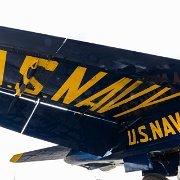
6 The Blue Angels is the United States Navy's flight demonstration squadron, with aviators from the Navy and Marines. The Blue Angels team was formed in 1946, making it the second oldest formal flying aerobatic team (under the same name) in the world, after the French Patrouille de France formed in 1931.
The Blue Angels' six demonstration pilots currently fly the McDonnell Douglas F/A-18 Hornet, typically in more than 70 shows at 34 locations throughout the United States each year, where they still employ many of the same practices and techniques used in their aerial displays in their inaugural 1946 season. An estimated 11 million spectators view the squadron during air shows each full year. The Blue Angels also visit more than 50,000 people in a standard show season (March through November) in schools and hospitals. Since 1946, the Blue Angels have flown for more than 260 million spectators.
The Blue Angels' six demonstration pilots currently fly the McDonnell Douglas F/A-18 Hornet, typically in more than 70 shows at 34 locations throughout the United States each year, where they still employ many of the same practices and techniques used in their aerial displays in their inaugural 1946 season. An estimated 11 million spectators view the squadron during air shows each full year. The Blue Angels also visit more than 50,000 people in a standard show season (March through November) in schools and hospitals. Since 1946, the Blue Angels have flown for more than 260 million spectators.

7 The Blue Angels is the United States Navy's flight demonstration squadron, with aviators from the Navy and Marines. The Blue Angels team was formed in 1946, making it the second oldest formal flying aerobatic team (under the same name) in the world, after the French Patrouille de France formed in 1931.
The Blue Angels' six demonstration pilots currently fly the McDonnell Douglas F/A-18 Hornet, typically in more than 70 shows at 34 locations throughout the United States each year, where they still employ many of the same practices and techniques used in their aerial displays in their inaugural 1946 season. An estimated 11 million spectators view the squadron during air shows each full year. The Blue Angels also visit more than 50,000 people in a standard show season (March through November) in schools and hospitals. Since 1946, the Blue Angels have flown for more than 260 million spectators.
The Blue Angels' six demonstration pilots currently fly the McDonnell Douglas F/A-18 Hornet, typically in more than 70 shows at 34 locations throughout the United States each year, where they still employ many of the same practices and techniques used in their aerial displays in their inaugural 1946 season. An estimated 11 million spectators view the squadron during air shows each full year. The Blue Angels also visit more than 50,000 people in a standard show season (March through November) in schools and hospitals. Since 1946, the Blue Angels have flown for more than 260 million spectators.
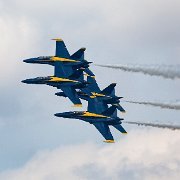
8 The Blue Angels is the United States Navy's flight demonstration squadron, with aviators from the Navy and Marines. The Blue Angels team was formed in 1946, making it the second oldest formal flying aerobatic team (under the same name) in the world, after the French Patrouille de France formed in 1931.
The Blue Angels' six demonstration pilots currently fly the McDonnell Douglas F/A-18 Hornet, typically in more than 70 shows at 34 locations throughout the United States each year, where they still employ many of the same practices and techniques used in their aerial displays in their inaugural 1946 season. An estimated 11 million spectators view the squadron during air shows each full year. The Blue Angels also visit more than 50,000 people in a standard show season (March through November) in schools and hospitals. Since 1946, the Blue Angels have flown for more than 260 million spectators.
The Blue Angels' six demonstration pilots currently fly the McDonnell Douglas F/A-18 Hornet, typically in more than 70 shows at 34 locations throughout the United States each year, where they still employ many of the same practices and techniques used in their aerial displays in their inaugural 1946 season. An estimated 11 million spectators view the squadron during air shows each full year. The Blue Angels also visit more than 50,000 people in a standard show season (March through November) in schools and hospitals. Since 1946, the Blue Angels have flown for more than 260 million spectators.
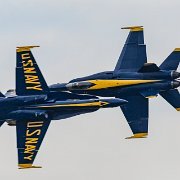
9 The Blue Angels is the United States Navy's flight demonstration squadron, with aviators from the Navy and Marines. The Blue Angels team was formed in 1946, making it the second oldest formal flying aerobatic team (under the same name) in the world, after the French Patrouille de France formed in 1931.
The Blue Angels' six demonstration pilots currently fly the McDonnell Douglas F/A-18 Hornet, typically in more than 70 shows at 34 locations throughout the United States each year, where they still employ many of the same practices and techniques used in their aerial displays in their inaugural 1946 season. An estimated 11 million spectators view the squadron during air shows each full year. The Blue Angels also visit more than 50,000 people in a standard show season (March through November) in schools and hospitals. Since 1946, the Blue Angels have flown for more than 260 million spectators.
The Blue Angels' six demonstration pilots currently fly the McDonnell Douglas F/A-18 Hornet, typically in more than 70 shows at 34 locations throughout the United States each year, where they still employ many of the same practices and techniques used in their aerial displays in their inaugural 1946 season. An estimated 11 million spectators view the squadron during air shows each full year. The Blue Angels also visit more than 50,000 people in a standard show season (March through November) in schools and hospitals. Since 1946, the Blue Angels have flown for more than 260 million spectators.
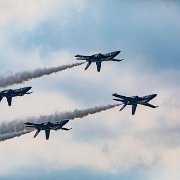
10 The Blue Angels is the United States Navy's flight demonstration squadron, with aviators from the Navy and Marines. The Blue Angels team was formed in 1946, making it the second oldest formal flying aerobatic team (under the same name) in the world, after the French Patrouille de France formed in 1931.
The Blue Angels' six demonstration pilots currently fly the McDonnell Douglas F/A-18 Hornet, typically in more than 70 shows at 34 locations throughout the United States each year, where they still employ many of the same practices and techniques used in their aerial displays in their inaugural 1946 season. An estimated 11 million spectators view the squadron during air shows each full year. The Blue Angels also visit more than 50,000 people in a standard show season (March through November) in schools and hospitals. Since 1946, the Blue Angels have flown for more than 260 million spectators.
The Blue Angels' six demonstration pilots currently fly the McDonnell Douglas F/A-18 Hornet, typically in more than 70 shows at 34 locations throughout the United States each year, where they still employ many of the same practices and techniques used in their aerial displays in their inaugural 1946 season. An estimated 11 million spectators view the squadron during air shows each full year. The Blue Angels also visit more than 50,000 people in a standard show season (March through November) in schools and hospitals. Since 1946, the Blue Angels have flown for more than 260 million spectators.
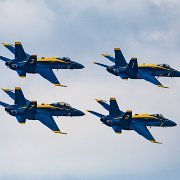
11 The Blue Angels is the United States Navy's flight demonstration squadron, with aviators from the Navy and Marines. The Blue Angels team was formed in 1946, making it the second oldest formal flying aerobatic team (under the same name) in the world, after the French Patrouille de France formed in 1931.
The Blue Angels' six demonstration pilots currently fly the McDonnell Douglas F/A-18 Hornet, typically in more than 70 shows at 34 locations throughout the United States each year, where they still employ many of the same practices and techniques used in their aerial displays in their inaugural 1946 season. An estimated 11 million spectators view the squadron during air shows each full year. The Blue Angels also visit more than 50,000 people in a standard show season (March through November) in schools and hospitals. Since 1946, the Blue Angels have flown for more than 260 million spectators.
The Blue Angels' six demonstration pilots currently fly the McDonnell Douglas F/A-18 Hornet, typically in more than 70 shows at 34 locations throughout the United States each year, where they still employ many of the same practices and techniques used in their aerial displays in their inaugural 1946 season. An estimated 11 million spectators view the squadron during air shows each full year. The Blue Angels also visit more than 50,000 people in a standard show season (March through November) in schools and hospitals. Since 1946, the Blue Angels have flown for more than 260 million spectators.

12 The Blue Angels is the United States Navy's flight demonstration squadron, with aviators from the Navy and Marines. The Blue Angels team was formed in 1946, making it the second oldest formal flying aerobatic team (under the same name) in the world, after the French Patrouille de France formed in 1931.
The Blue Angels' six demonstration pilots currently fly the McDonnell Douglas F/A-18 Hornet, typically in more than 70 shows at 34 locations throughout the United States each year, where they still employ many of the same practices and techniques used in their aerial displays in their inaugural 1946 season. An estimated 11 million spectators view the squadron during air shows each full year. The Blue Angels also visit more than 50,000 people in a standard show season (March through November) in schools and hospitals. Since 1946, the Blue Angels have flown for more than 260 million spectators.
The Blue Angels' six demonstration pilots currently fly the McDonnell Douglas F/A-18 Hornet, typically in more than 70 shows at 34 locations throughout the United States each year, where they still employ many of the same practices and techniques used in their aerial displays in their inaugural 1946 season. An estimated 11 million spectators view the squadron during air shows each full year. The Blue Angels also visit more than 50,000 people in a standard show season (March through November) in schools and hospitals. Since 1946, the Blue Angels have flown for more than 260 million spectators.
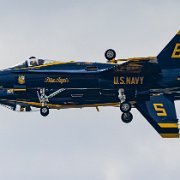
13 The Blue Angels is the United States Navy's flight demonstration squadron, with aviators from the Navy and Marines. The Blue Angels team was formed in 1946, making it the second oldest formal flying aerobatic team (under the same name) in the world, after the French Patrouille de France formed in 1931.
The Blue Angels' six demonstration pilots currently fly the McDonnell Douglas F/A-18 Hornet, typically in more than 70 shows at 34 locations throughout the United States each year, where they still employ many of the same practices and techniques used in their aerial displays in their inaugural 1946 season. An estimated 11 million spectators view the squadron during air shows each full year. The Blue Angels also visit more than 50,000 people in a standard show season (March through November) in schools and hospitals. Since 1946, the Blue Angels have flown for more than 260 million spectators.
The Blue Angels' six demonstration pilots currently fly the McDonnell Douglas F/A-18 Hornet, typically in more than 70 shows at 34 locations throughout the United States each year, where they still employ many of the same practices and techniques used in their aerial displays in their inaugural 1946 season. An estimated 11 million spectators view the squadron during air shows each full year. The Blue Angels also visit more than 50,000 people in a standard show season (March through November) in schools and hospitals. Since 1946, the Blue Angels have flown for more than 260 million spectators.
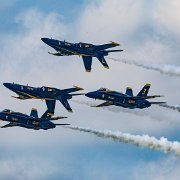
14 The Blue Angels is the United States Navy's flight demonstration squadron, with aviators from the Navy and Marines. The Blue Angels team was formed in 1946, making it the second oldest formal flying aerobatic team (under the same name) in the world, after the French Patrouille de France formed in 1931.
The Blue Angels' six demonstration pilots currently fly the McDonnell Douglas F/A-18 Hornet, typically in more than 70 shows at 34 locations throughout the United States each year, where they still employ many of the same practices and techniques used in their aerial displays in their inaugural 1946 season. An estimated 11 million spectators view the squadron during air shows each full year. The Blue Angels also visit more than 50,000 people in a standard show season (March through November) in schools and hospitals. Since 1946, the Blue Angels have flown for more than 260 million spectators.
The Blue Angels' six demonstration pilots currently fly the McDonnell Douglas F/A-18 Hornet, typically in more than 70 shows at 34 locations throughout the United States each year, where they still employ many of the same practices and techniques used in their aerial displays in their inaugural 1946 season. An estimated 11 million spectators view the squadron during air shows each full year. The Blue Angels also visit more than 50,000 people in a standard show season (March through November) in schools and hospitals. Since 1946, the Blue Angels have flown for more than 260 million spectators.
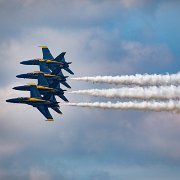
15 The Blue Angels is the United States Navy's flight demonstration squadron, with aviators from the Navy and Marines. The Blue Angels team was formed in 1946, making it the second oldest formal flying aerobatic team (under the same name) in the world, after the French Patrouille de France formed in 1931.
The Blue Angels' six demonstration pilots currently fly the McDonnell Douglas F/A-18 Hornet, typically in more than 70 shows at 34 locations throughout the United States each year, where they still employ many of the same practices and techniques used in their aerial displays in their inaugural 1946 season. An estimated 11 million spectators view the squadron during air shows each full year. The Blue Angels also visit more than 50,000 people in a standard show season (March through November) in schools and hospitals. Since 1946, the Blue Angels have flown for more than 260 million spectators.
The Blue Angels' six demonstration pilots currently fly the McDonnell Douglas F/A-18 Hornet, typically in more than 70 shows at 34 locations throughout the United States each year, where they still employ many of the same practices and techniques used in their aerial displays in their inaugural 1946 season. An estimated 11 million spectators view the squadron during air shows each full year. The Blue Angels also visit more than 50,000 people in a standard show season (March through November) in schools and hospitals. Since 1946, the Blue Angels have flown for more than 260 million spectators.
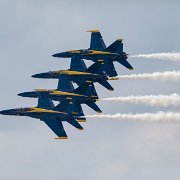
16 The Blue Angels is the United States Navy's flight demonstration squadron, with aviators from the Navy and Marines. The Blue Angels team was formed in 1946, making it the second oldest formal flying aerobatic team (under the same name) in the world, after the French Patrouille de France formed in 1931.
The Blue Angels' six demonstration pilots currently fly the McDonnell Douglas F/A-18 Hornet, typically in more than 70 shows at 34 locations throughout the United States each year, where they still employ many of the same practices and techniques used in their aerial displays in their inaugural 1946 season. An estimated 11 million spectators view the squadron during air shows each full year. The Blue Angels also visit more than 50,000 people in a standard show season (March through November) in schools and hospitals. Since 1946, the Blue Angels have flown for more than 260 million spectators.
The Blue Angels' six demonstration pilots currently fly the McDonnell Douglas F/A-18 Hornet, typically in more than 70 shows at 34 locations throughout the United States each year, where they still employ many of the same practices and techniques used in their aerial displays in their inaugural 1946 season. An estimated 11 million spectators view the squadron during air shows each full year. The Blue Angels also visit more than 50,000 people in a standard show season (March through November) in schools and hospitals. Since 1946, the Blue Angels have flown for more than 260 million spectators.
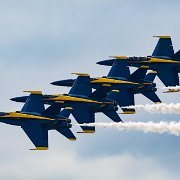
17 The Blue Angels is the United States Navy's flight demonstration squadron, with aviators from the Navy and Marines. The Blue Angels team was formed in 1946, making it the second oldest formal flying aerobatic team (under the same name) in the world, after the French Patrouille de France formed in 1931.
The Blue Angels' six demonstration pilots currently fly the McDonnell Douglas F/A-18 Hornet, typically in more than 70 shows at 34 locations throughout the United States each year, where they still employ many of the same practices and techniques used in their aerial displays in their inaugural 1946 season. An estimated 11 million spectators view the squadron during air shows each full year. The Blue Angels also visit more than 50,000 people in a standard show season (March through November) in schools and hospitals. Since 1946, the Blue Angels have flown for more than 260 million spectators.
The Blue Angels' six demonstration pilots currently fly the McDonnell Douglas F/A-18 Hornet, typically in more than 70 shows at 34 locations throughout the United States each year, where they still employ many of the same practices and techniques used in their aerial displays in their inaugural 1946 season. An estimated 11 million spectators view the squadron during air shows each full year. The Blue Angels also visit more than 50,000 people in a standard show season (March through November) in schools and hospitals. Since 1946, the Blue Angels have flown for more than 260 million spectators.
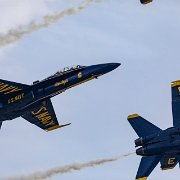
18 The Blue Angels is the United States Navy's flight demonstration squadron, with aviators from the Navy and Marines. The Blue Angels team was formed in 1946, making it the second oldest formal flying aerobatic team (under the same name) in the world, after the French Patrouille de France formed in 1931.
The Blue Angels' six demonstration pilots currently fly the McDonnell Douglas F/A-18 Hornet, typically in more than 70 shows at 34 locations throughout the United States each year, where they still employ many of the same practices and techniques used in their aerial displays in their inaugural 1946 season. An estimated 11 million spectators view the squadron during air shows each full year. The Blue Angels also visit more than 50,000 people in a standard show season (March through November) in schools and hospitals. Since 1946, the Blue Angels have flown for more than 260 million spectators.
The Blue Angels' six demonstration pilots currently fly the McDonnell Douglas F/A-18 Hornet, typically in more than 70 shows at 34 locations throughout the United States each year, where they still employ many of the same practices and techniques used in their aerial displays in their inaugural 1946 season. An estimated 11 million spectators view the squadron during air shows each full year. The Blue Angels also visit more than 50,000 people in a standard show season (March through November) in schools and hospitals. Since 1946, the Blue Angels have flown for more than 260 million spectators.
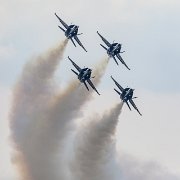
19 The Blue Angels is the United States Navy's flight demonstration squadron, with aviators from the Navy and Marines. The Blue Angels team was formed in 1946, making it the second oldest formal flying aerobatic team (under the same name) in the world, after the French Patrouille de France formed in 1931.
The Blue Angels' six demonstration pilots currently fly the McDonnell Douglas F/A-18 Hornet, typically in more than 70 shows at 34 locations throughout the United States each year, where they still employ many of the same practices and techniques used in their aerial displays in their inaugural 1946 season. An estimated 11 million spectators view the squadron during air shows each full year. The Blue Angels also visit more than 50,000 people in a standard show season (March through November) in schools and hospitals. Since 1946, the Blue Angels have flown for more than 260 million spectators.
The Blue Angels' six demonstration pilots currently fly the McDonnell Douglas F/A-18 Hornet, typically in more than 70 shows at 34 locations throughout the United States each year, where they still employ many of the same practices and techniques used in their aerial displays in their inaugural 1946 season. An estimated 11 million spectators view the squadron during air shows each full year. The Blue Angels also visit more than 50,000 people in a standard show season (March through November) in schools and hospitals. Since 1946, the Blue Angels have flown for more than 260 million spectators.
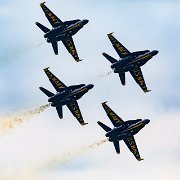
20 The Blue Angels is the United States Navy's flight demonstration squadron, with aviators from the Navy and Marines. The Blue Angels team was formed in 1946, making it the second oldest formal flying aerobatic team (under the same name) in the world, after the French Patrouille de France formed in 1931.
The Blue Angels' six demonstration pilots currently fly the McDonnell Douglas F/A-18 Hornet, typically in more than 70 shows at 34 locations throughout the United States each year, where they still employ many of the same practices and techniques used in their aerial displays in their inaugural 1946 season. An estimated 11 million spectators view the squadron during air shows each full year. The Blue Angels also visit more than 50,000 people in a standard show season (March through November) in schools and hospitals. Since 1946, the Blue Angels have flown for more than 260 million spectators.
The Blue Angels' six demonstration pilots currently fly the McDonnell Douglas F/A-18 Hornet, typically in more than 70 shows at 34 locations throughout the United States each year, where they still employ many of the same practices and techniques used in their aerial displays in their inaugural 1946 season. An estimated 11 million spectators view the squadron during air shows each full year. The Blue Angels also visit more than 50,000 people in a standard show season (March through November) in schools and hospitals. Since 1946, the Blue Angels have flown for more than 260 million spectators.
Blue Angels